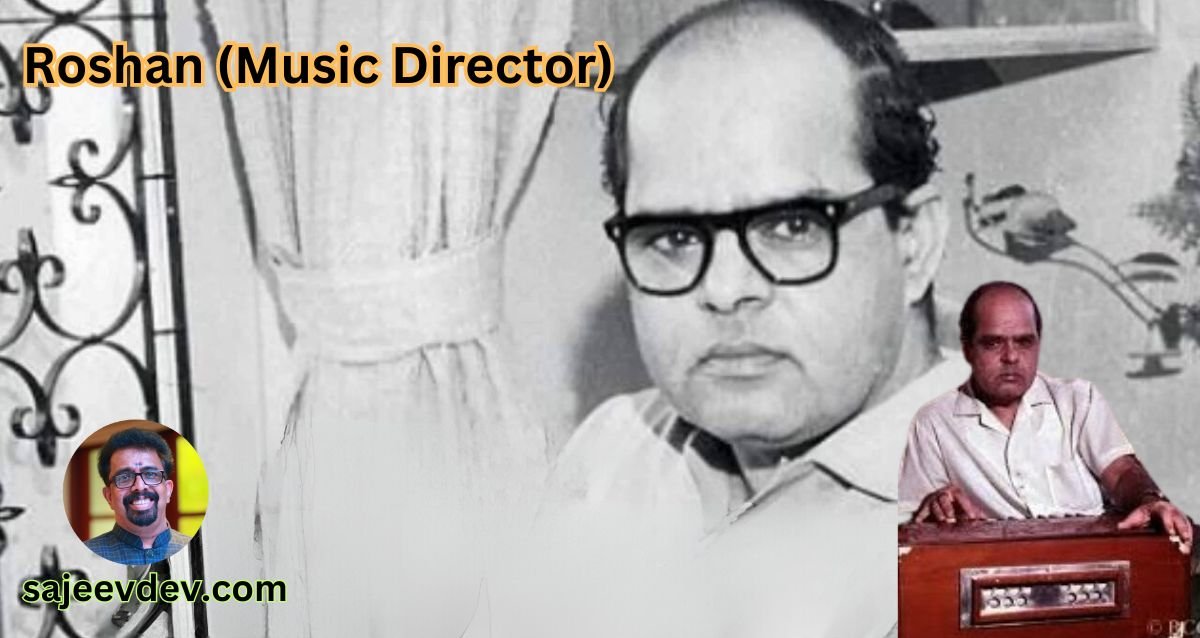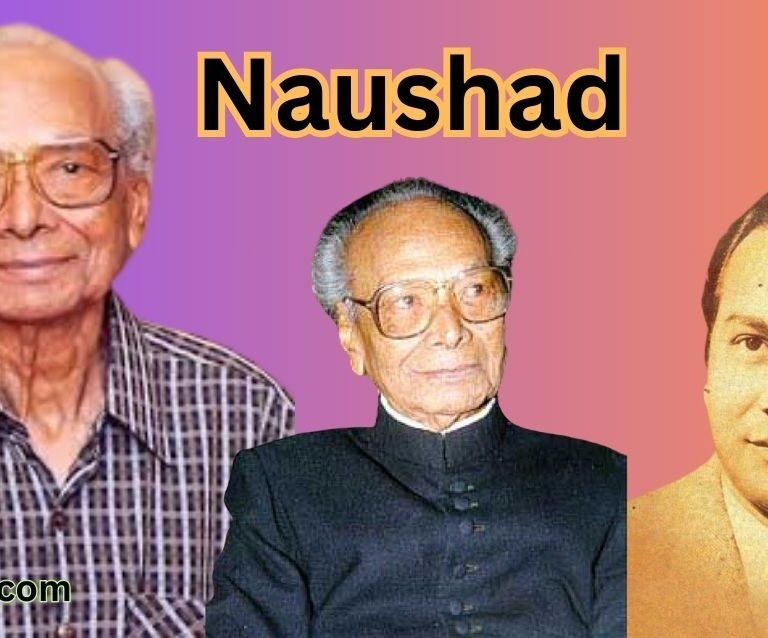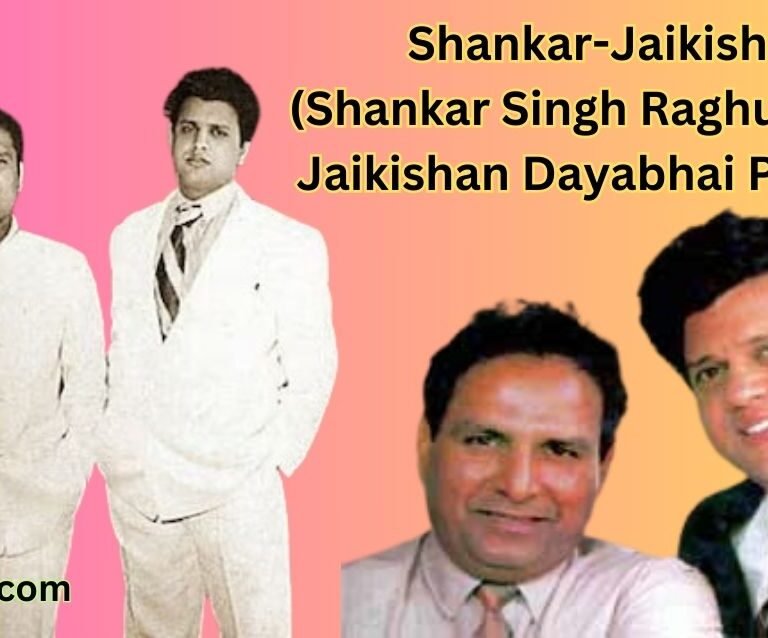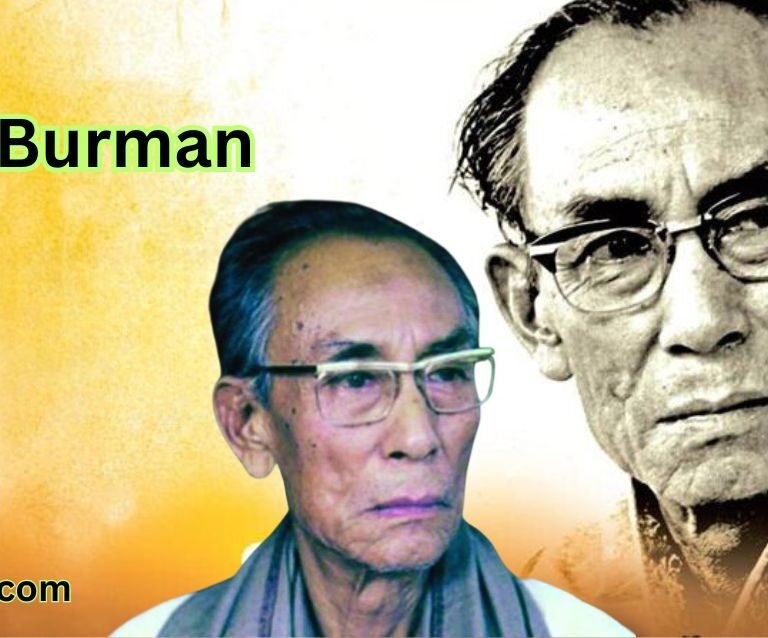Roshan Lal Nagrath
Roshan Lal Nagrath, born in 1917 in the quaint town of Gujranwala (currently in Pakistan), is a name that resonates deeply in the annals of Indian music history. His early life was steeped in an atmosphere of cultural richness, where the melodies of traditional music profoundly influenced his budding passion for the art. Roshan’s initial exposure to music came from his family, where his father, a prominent lawyer, ensured that young Roshan was exposed to the finest musical traditions of the time.
As he grew, Roshan nurtured his talents and dreams of making a mark in the world of music, a journey that would eventually lead him to the vibrant and competitive film industry of Bombay (now Mumbai). Despite the turbulence of India’s pre-independence era and the subsequent partition, Roshan’s resolve remained unshaken. It was this unyielding determination and his inherent musical genius that saw him through his initial struggles in Bombay.
The transition from a small town to the bustling streets of Bombay was not without its challenges. The film industry then was a melting pot of emerging talent and fierce competition. Roshan faced numerous obstacles, from finding his footing in an industry dominated by already established musicians to securing opportunities that would showcase his unique flair and compositions. However, his profound understanding of classical music, coupled with innovative orchestration, soon began to stand out.
Roshan’s early compositions received critical acclaim, slowly but surely carving out a niche for him in the Hindi film music industry. His ability to blend classical nuances with modern sensibilities caught the attention of both filmmakers and audiences alike, setting the stage for a career that would go on to leave an indelible mark on Indian cinema. This period of his life, marked by perseverance and unrelenting dedication, laid the foundation for what would become a celebrated musical legacy.
Breakthrough with ‘Barsaat Ki Raat’
Roshan Lal Nagrath, affectionately known simply as Roshan, saw his first major breakthrough with the film Barsaat Ki Raat in 1960. Barsaat Ki Raat not only cemented his status as a revered music composer in Bollywood but also underscored the symbiotic relationship he shared with eminent lyricists and singers of that era. The film’s music was pivotal, greatly contributing to its success and leaving an indelible mark on Indian cinema.
Roshan collaborated with legendary lyricists such as Sahir Ludhianvi, whose poignant and profound writing elevated the emotional quotient of the songs. Ludhianvi’s lyrical genius seamlessly blended with Roshan’s melodic compositions. The collaboration between these two titans resulted in a musical masterpiece that resonated with audiences across the nation.
The film featured iconic songs like ‘Zindagi Bhar Nahin Bhoolegi,’ which exemplified Roshan’s flair for creating timeless melodies that could capture the essence of romance and longing. Playback singers Mohammed Rafi and Lata Mangeshkar brought these songs to life with their soulful voices, imbuing them with emotional depth and authenticity. Rafi’s rendition of ‘Zindagi Bhar Nahin Bhoolegi’ became especially memorable, etching the song into the annals of Bollywood’s musical heritage.
Audiences and critics alike were captivated by the mesmerizing music of Barsaat Ki Raat. The masterful orchestration and evocative compositions received widespread acclaim, reinforcing Roshan’s reputation as a composer of exceptional talent and creative prowess. The musical success of Barsaat Ki Raat proved to be a turning point in his career, garnering him recognition and acclaim that transcended the boundaries of conventional film music.
ROS visualizationBarsaat Ki Raat succeeded in setting a high bar for subsequent films, becoming a reference point for excellence in film music composition. It remains a testament to Roshan’s genius, illustrating his ability to craft melodies that are both timeless and evocative, solidifying his legacy in the pantheon of Bollywood music maestros.
Iconic Contributions in ‘Taj Mahal’ and Other Films
Roshan Lal Nagrath’s captivating musical compositions have left an indelible mark on Indian cinema, with his work in the film ‘Taj Mahal’ standing as a significant testament to his artistry. The backdrop of ‘Taj Mahal’ demanded a score that captured the grandeur, romance, and historical significance of the subject matter. Roshan masterfully delivered this through unforgettable melodies that continue to resonate with audiences today.
The song ‘Jo Wada Kiya,’ for instance, became an instant classic and remains etched in the annals of Bollywood music history. Its soulful lyrics, combined with Roshan’s poignant composition, evoke deep emotions, making it an exemplary piece of his musical legacy. The meticulous crafting of this song, along with the entire soundtrack, underscores Roshan’s ability to blend traditional and contemporary elements seamlessly, creating a timeless auditory experience.
Beyond ‘Taj Mahal,’ Roshan contributed significantly to the soundscapes of numerous other films, each showcasing his unique musical style. His work in movies like ‘Barsaat Ki Raat’, ‘Bawre Nain’, and ‘Chitralekha’ highlights his versatility and innovative approach to film music. In ‘Barsaat Ki Raat,’ Roshan’s score beautifully complemented the film’s narrative, with songs like ‘Zindagi Bhar Nahin Bhoolegi’ enduring as cherished classics. His compositions often embraced classical Indian music, yet were accessible and endearing to a broad audience, reflecting his thorough understanding of musical storytelling.
Roshan’s distinctive sound was characterized by intricate arrangements and heartfelt melodies. His ability to convey complex emotions through music made each composition a unique auditory experience, allowing him to leave a lasting impact on the Indian music industry. Whether it was the melancholic strains of a romantic ballad or the exuberant rhythms of a festive song, Roshan’s music consistently mirrored the essence of the films he worked on, cementing his legacy as a maestro of Indian film music.
Musical Style and Innovations
Roshan Lal Nagrath carved a unique niche in the annals of Indian music through his distinctive musical style and innovative approach to orchestration. His compositions were notably distinguished by his adept use of classical ragas, a hallmark that showcased his profound understanding and respect for traditional Indian music. Each of Roshan’s works echoes the timeless beauty of classical ragas, yet it is his ability to seamlessly integrate these elements with modern cinematic sounds that truly set his music apart.
One of the most remarkable aspects of Roshan’s musical style was his innovative orchestration. He skillfully combined traditional Indian instruments such as the sitar, tabla, and flute with Western instruments like the violin, piano, and clarinet. This amalgamation not only enriched the auditory experience but also broadened the appeal of his music. His use of orchestral arrangements added a layer of grandeur and complexity, making his compositions distinctively memorable.
A prime example of Roshan’s innovative musical techniques is evident in the classic song “Jo Wada Kiya Wo,” from the movie Taj Mahal. Here, Roshan blends the raga-based melody with lush orchestral arrangements, creating an ethereal and emotionally resonant piece. The careful balance between traditional ragas and contemporary cinematic elements exemplifies Roshan’s finesse in crafting a sound that was both rooted in tradition and appealing to modern sensibilities.
Roshan’s compositions often featured intricate interplays of rhythm and melody, highlighting his mastery in creating harmonious and melodious tunes. His use of the raga Yaman in songs like “Aap Ki Nazron Ne Samjha” showcases his ability to evoke deep emotions through melodic structure, further enhancing the lyrical beauty of the songs. His work on the film Barsaat Ki Raat, particularly the qawwali “Na Toh Karvan Ki Talaash Hai,” integrates classical qawwali elements with a modern twist, showcasing his versatility and creativity.
Through these examples, it is evident that Roshan Lal Nagrath’s musical style was a perfect blend of innovation and tradition. His pioneering approach not only distinguished his work from contemporaries but also left an indelible mark on the Indian music landscape, influencing countless musicians and composers in the years to follow.
Legacy and Influence on Future Generations
Roshan Lal Nagrath, exceptionally admired for his versatility and soulful compositions, has had an indelible influence on the contours of Indian music, resonating through the decades. His music introduced a blend of classical and contemporary styles that have continued to inspire and shape subsequent generations of music composers and singers. The legacy of Roshan extends beyond his own era, touching the hearts and influencing the work of many notable artists who followed.
In numerous interviews, celebrated composers like R.D. Burman and Laxmikant-Pyarelal have openly credited Roshan Lal Nagrath for being a significant source of inspiration. R.D. Burman once mentioned, “Roshan’s compositions were ahead of their time, a seamless fusion of tradition and innovation that I always aspired to achieve in my music.” These words encapsulate the reverence and admiration leading figures in the music industry held for Roshan.
Among contemporary singers, Lata Mangeshkar and Kishore Kumar were deeply influenced by Roshan’s ability to bring out the richness in vocal performance. Lata Mangeshkar’s articulation of his genius underscores this when she remarked, “The way Roshanji understood emotion and translated it into his music was unparalleled. Singing for him was a unique spiritual experience.” Such high regard reflects how he not only inspired but also elevated the performances of the industry’s best talents.
Anecdotes about Roshan’s attention to detail and his passionate drive for music further illustrate his remarkable influence. One often-cited story involves how Roshan would spend hours perfecting a single melody, ensuring that every note conveyed the intended emotion. This dedication left a deep impression on his contemporaries and budding musicians alike, setting a standard of excellence that many strive to uphold to this day.
His impact is further highlighted by the fact that Roshan’s son, Rajesh Roshan, seamlessly continued his father’s legacy, achieving his own noteworthy success in the industry. He frequently acknowledges his father’s profound guidance and musical principles that have kept him grounded and creatively inspired through his career.
Roshan Lal Nagrath’s legacy is a tapestry of emotional richness and technical brilliance, ensuring his melodies will remain timeless. This lasting influence continues to foster creativity in the Indian music industry, empowering future generations to explore and innovate within the enchanting world of music.“`html
Personal Life and Beyond the Compositions
Roshan Lal Nagrath, often known simply as Roshan, was not merely a gifted composer; he was a devoted family man whose personal life sheds light on his musical genius. Born in a musically inclined family, Roshan’s passion for music was nurtured from a young age. His family environment, rich in cultural and musical influences, played a significant role in shaping his artistic path. He was married to Ira Roshan, who herself was intricately connected to the world of music and film. Their union was not just a partnership in life but also in art, providing Roshan with emotional stability and creative inspiration.
Roshan’s personal experiences profoundly impacted his compositions. The melodies he crafted often carried a deep, soulful resonance, reflecting the various shades of his life. It is said that his life’s joys and sorrows translated into the emotional depth heard in his work. This emotional connection is unmistakable in iconic compositions such as “Rahe na rahe hum” and “Jo Wada Kiya,” where listeners can almost feel Roshan’s innermost thoughts and feelings.
Roshan’s children have also etched their marks on the artistic community, thus continuing his legacy. His son, Rakesh Roshan, has been a prevailing force in the Indian film industry, not only as a film producer and director but also as a former actor. Under his direction, unforgettable movies like “Kaho Naa… Pyaar Hai” and the “Koi… Mil Gaya” series have emerged, which further underscore the family’s lasting influence on Indian cinema. Another significant name is his grandson, Hrithik Roshan, who has become a celebrated actor, earning accolades and a massive fan following.
The Roshan family’s contributions span across generations, and they underscore the importance of Roshan’s legacy—not just within the realm of music but also beyond, affecting film and popular culture at large. His personal life, family ties, and the continuing influence of his descendants highlight the enduring nature of Roshan’s timeless melodies and artistic contributions.
Challenges and Triumphs in a Competitive Industry
Roshan Lal Nagrath, commonly known as Roshan, undoubtedly navigated an immensely competitive landscape in the Indian film music industry throughout his illustrious career. Whenever a musical scene flourishes, it inevitably encounters intense rivalries, and Roshan’s career was no exception. He faced stiff competition from contemporaries like S.D. Burman, Naushad, and Shankar-Jaikishan, whose gripping compositions consistently captured the public’s imagination. Amid such competition, Roshan needed to carve out a unique identify for himself, ensuring his compositions did not get lost in the crowd.
One of the significant challenges Roshan faced was the shifting musical preferences of the audience. The post-Partition era brought about a wave of Western influence on Indian music, resulting in evolving tastes and expectations. His ability to stay relevant in this rapidly changing environment speaks volumes about his adaptive skills and true talent. Roshan demonstrated a mix of innovation and tradition that appealed to the masses while retaining the essence of Indian classical music within his compositions.
Moreover, Roshan had to contend with the whims of the film industry. Commercial pressures, producer demands, and ever-changing trends posed significant hurdles, yet he consistently delivered soundtracks that were not only critically acclaimed but also cherished by the audience. His nuanced understanding of blending the script’s requirements with melodious tunes ensured that his music stood the test of time.
A noteworthy triumph amidst these challenges was Roshan’s masterful integration of classical Indian music within the populist framework of Bollywood. This balance allowed him to produce memorable songs that stood distinct in their profundity and appeal. Timeless melodies like “Rahe Na Rahe Hum” and “Aye Dil Mujhe Bata De” are a testament to his illustrious success. In sum, the challenges Roshan encountered only seemed to fortify his resolve, paving the way for triumphs that underscore his musical legacy.
Celebrating a Musical Maestro
Roshan Lal Nagrath’s contributions to Hindi film music stand as a monumental testament to his artistic genius and enduring legacy. Over the span of his illustrious career, Roshan composed songs that not only captured the essence of the narratives they supported but also transcended the boundaries of time and cultural shifts. His ability to weave intricate melodies with classical Indian music and modern arrangements has resulted in a rich tapestry of timeless compositions that continue to resonate with audiences across generations.
One of the notable facets of Roshan’s music is its universal appeal and emotional depth. Tracks like “Rahen Na Rahen Hum” and “Jo Wada Kiya” evoke profound emotions, drawing listeners into a world of lyrical beauty and melodic mastery. His work reflects a fusion of tradition and innovation, illustrating his exceptional ability to adapt and thrive in the evolving landscape of Hindi film music.
Moreover, Roshan’s legacy is evident in the way his music continues to inspire contemporary composers and musicians. His compositions are frequently revisited and reinterpreted, underscoring their relevance in today’s music scene. This enduring quality of his work ensures that new generations of music enthusiasts can discover and appreciate the nuanced craftsmanship that Roshan embodied.
The timeless melodies of Roshan Lal Nagrath serve as a bridge, connecting the golden era of Hindi cinema to our present-day musical experiences. His contributions have left an indelible mark on the industry, carving out a legacy that is celebrated and cherished by music lovers around the world.
As we reflect on his distinguished career and the depth of his musical catalog, we are reminded of the extraordinary talent that Roshan possessed. We encourage readers to delve into his extensive body of work, to listen, appreciate, and find solace in the artistry that has gracefully withstood the test of time.









